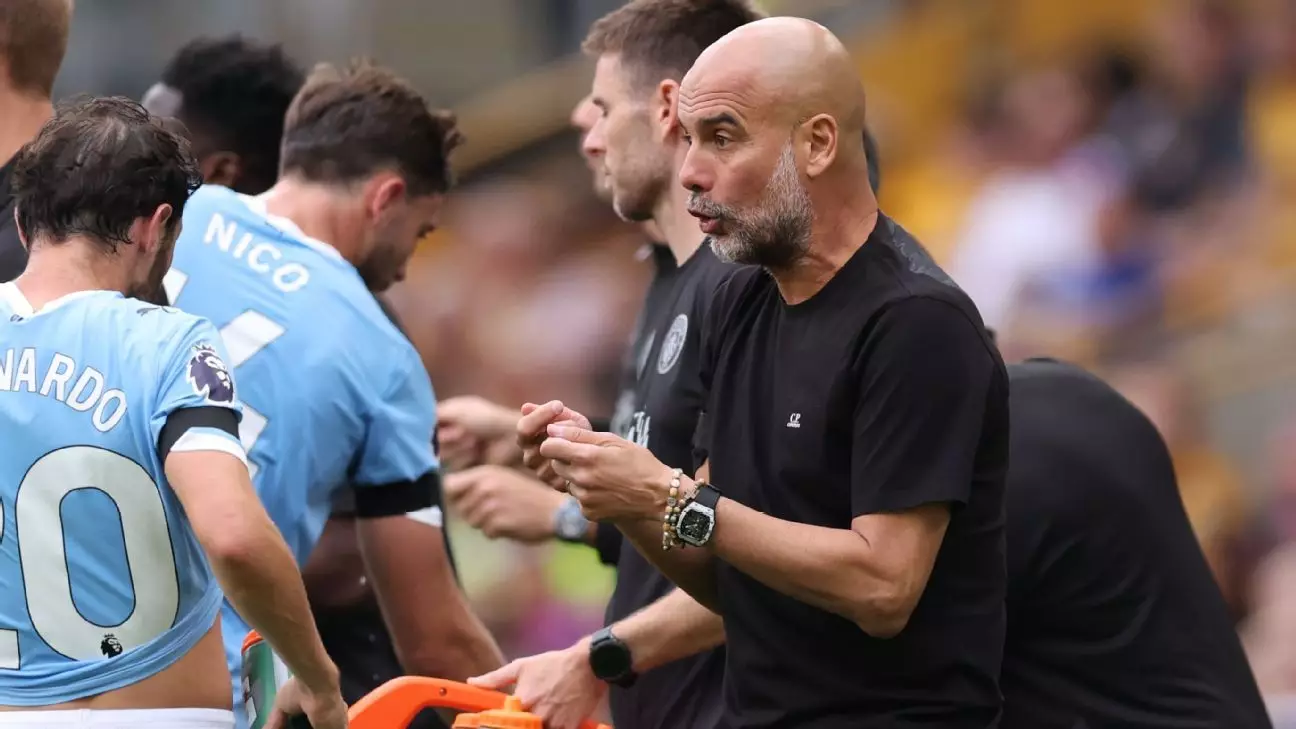Manchester City’s commanding 4-0 victory over Wolverhampton Wanderers served as an emphatic statement of their ongoing dominance in English football. While results on opening weekends can sometimes be misleading—either overinflating expectations or masking underlying issues—this performance appeared to blend technical excellence with tactical discipline. Erling Haaland’s brace showcased his relentless goal-scoring instinct, reaffirming his status as a formidable force in the Premier League. New signings Tijjani Reijnders and Rayan Cherki displayed promising adaptability, hinting at a squad that, despite its strengths, still has untapped potential.
Yet, beyond the surface of celebration, a more complex narrative quietly unfolds. City’s convincing start masks underlying challenges, especially regarding squad management and club dynamics. Guardiola’s comments reflect a nuanced understanding that victory alone cannot conceal the need for structural improvements—a theme that warrants closer examination.
Squad Depth: Asset or Liability?
One of Guardiola’s critical insights was his concern about the “not healthy” squad size, a problem that many top clubs encounter when balancing ambition with sustainability. While a large squad offers flexibility and the ability to compete across multiple competitions, it also introduces a disconnect—players may feel disconnected or discontent if they perceive limited chances to contribute. Guardiola emphasized that an oversaturated group hampers both morale and chemistry, fostering an environment where teamwork and positive atmosphere suffer.
This comment isn’t merely managerial grumbling; it’s a pragmatic reality check. The modern game demands not just deep squads but also a cohesive environment where competition for playing time breeds motivation rather than frustration. City’s approach to squad building, perhaps overly reliant on quantity at times, now confronts the necessity of trimming the squad to foster a more harmonious, effective unit.
Guardiola’s forthcoming negotiations, aimed at offloading players, underscore his commitment to this principle. While the strategy may involve tough decisions—like parting with familiar faces—it ultimately aims to create a more focused, motivated team that can maximize their collective potential without internal discord.
Goalkeeper Dilemmas and Future Uncertainty
The situation surrounding goalkeeper Ederson epitomizes the club’s broader dilemma: balancing stability with ambition. Despite persistent rumors linking City to Gianluigi Donnarumma and other top options, Guardiola reaffirmed Ederson’s central role, attributing his absence at Wolves solely to illness. Yet, the persistent speculation signals a deeper unrest—fans and pundits sense that the club is actively exploring options for a potential upgrade or simply safeguarding future readiness.
Guardiola’s comments reveal a careful narrative: Ederson remains the “number one,” but the club retains options if circumstances change. This strategic ambiguity exposes a club in transition, where the pursuit of squad improvement occasionally clashes with internal loyalty. Such tension is natural at elite levels; however, it necessitates a delicate balance to maintain team unity while preparing for future challenges.
Additionally, the club’s handling of Ederson’s situation showcases Guardiola’s managerial acumen—calmly deflecting rumors and emphasizing club authority over individual negotiations. Such leadership is crucial to ensure that internal dynamics do not spill over into on-field contention.
Progress and Potential for Improvement
While Guardiola expressed satisfaction with the results, his acknowledgment that “there is room for improvement” demonstrates a realistic and necessary humility. Early-season performances are often a reflection of adaptation phases, and Guardiola’s pragmatic outlook highlights that City’s journey to defending their crown is far from complete.
City’s tactical approach—exploiting transitions with incredible pace—proved effective against Wolves. However, the second-half jitters reveal areas demanding refinement. Moving forward, Guardiola will likely emphasize cohesion, tactical discipline, and squad harmony, especially as the intensity of multiple competitions ramps up.
Reijnders’ impactful debut underscores the importance of smart recruitment—players who adapt rapidly and contribute from day one. Such signings are vital for City’s ongoing sustainability, especially considering the physical toll and mental fatigue that come with a relentless fixture schedule.
Implications for City’s Long-Term Strategy
City’s current circumstances reflect a broader strategic conversation—one about balancing immediate success with long-term stability. Guardiola’s desire for a “deep squad” is essential; however, the pitfalls of overextension are evident. The club’s readiness to identify and offload surplus players indicates a mature understanding that managing squad dynamics is as crucial as tactical mastery.
This situation reminds us that even the most successful clubs must continually evolve, not just in tactics and signings but in internal culture. A team cannot solely rely on star power; it needs a cohesive, motivated core willing to accept competition and adapt to managerial vision. Guardiola’s focus on offloading players and restructuring the squad suggests a calculated move to prevent complacency and preserve their competitive edge.
In essence, Manchester City’s triumphant start is as much about strategic planning as it is about footballing talent. The challenge now lies in translating early-season form into sustained excellence—requiring not just tactical brilliance but also internal harmony, cultural cohesion, and disciplined squad management.


Leave a Reply